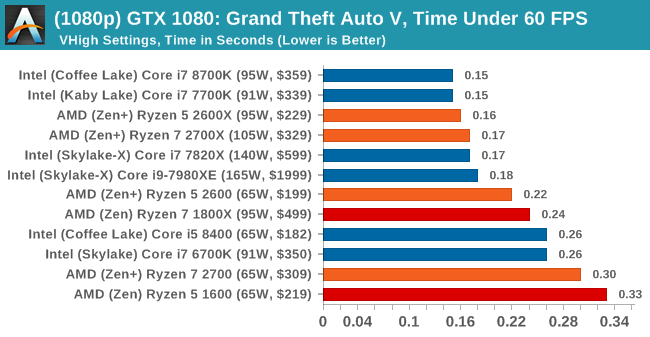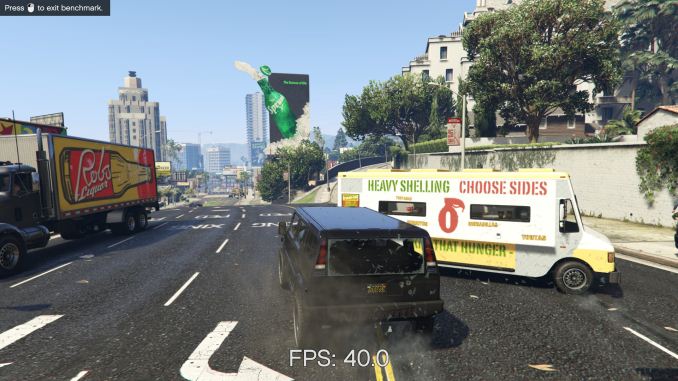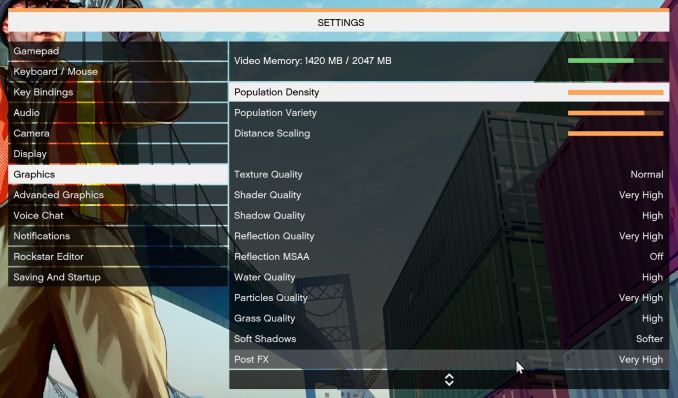The AMD 2nd Gen Ryzen Deep Dive: The 2700X, 2700, 2600X, and 2600 Tested
by Ian Cutress on April 19, 2018 9:00 AM ESTGrand Theft Auto
The highly anticipated iteration of the Grand Theft Auto franchise hit the shelves on April 14th 2015, with both AMD and NVIDIA in tow to help optimize the title. GTA doesn’t provide graphical presets, but opens up the options to users and extends the boundaries by pushing even the hardest systems to the limit using Rockstar’s Advanced Game Engine under DirectX 11. Whether the user is flying high in the mountains with long draw distances or dealing with assorted trash in the city, when cranked up to maximum it creates stunning visuals but hard work for both the CPU and the GPU.
For our test we have scripted a version of the in-game benchmark. The in-game benchmark consists of five scenarios: four short panning shots with varying lighting and weather effects, and a fifth action sequence that lasts around 90 seconds. We use only the final part of the benchmark, which combines a flight scene in a jet followed by an inner city drive-by through several intersections followed by ramming a tanker that explodes, causing other cars to explode as well. This is a mix of distance rendering followed by a detailed near-rendering action sequence, and the title thankfully spits out frame time data.
There are no presets for the graphics options on GTA, allowing the user to adjust options such as population density and distance scaling on sliders, but others such as texture/shadow/shader/water quality from Low to Very High. Other options include MSAA, soft shadows, post effects, shadow resolution and extended draw distance options. There is a handy option at the top which shows how much video memory the options are expected to consume, with obvious repercussions if a user requests more video memory than is present on the card (although there’s no obvious indication if you have a low end GPU with lots of GPU memory, like an R7 240 4GB).
To that end, we run the benchmark at 1920x1080 using an average of Very High on the settings, and also at 4K using High on most of them. We take the average results of four runs, reporting frame rate averages, 99th percentiles, and our time under analysis.
All of our benchmark results can also be found in our benchmark engine, Bench.
MSI GTX 1080 Gaming 8G Performance
1080p



4K
















545 Comments
View All Comments
spdragoo - Thursday, April 19, 2018 - link
Per Tom's Hardware (https://www.tomshardware.com/reviews/amd-ryzen-7-2..."Our test rigs now include Meltdown And Spectre Variant 1 mitigations. Spectre Variant 2 requires both motherboard firmware/microcode and operating system patches. We have installed the operating system patches for Variant 2.
Today's performance measurements do not include Intel's motherboard firmware mitigations for Spectre Variant 2 though, as we've been waiting for AMD patches to level the playing field. Last week, AMD announced that it’s making the mitigations available to motherboard vendors and OEMs, which the company says should take time to appear in the wild. We checked MSI's website for firmware updates applicable to our X370 platforms when AMD made its announcement, but no new BIOSes were available (and still aren't).
Unfortunately, we were only made aware that Variant 2 mitigations are present in our X470 board's firmware just before launch, precluding us from re-testing the Intel platforms with patches applied. We're working on this now, and plan to post updated results in future reviews.
The lack of Spectre Variant 2 patches in our Intel results likely give the Core CPUs a slight advantage over AMD's patched platforms. But the performance difference should be minimal with modern processors."
For those that are TL:DR in their viewpoint: unlike Anandtech, TH did NOT include all of the Spectre/Meltdown patches, & even said that there might be differences in their test results.
Chris113q - Thursday, April 19, 2018 - link
Other reviewers also had their setups meltdown/spectre patched and it's been already confirmed that these patches don't greatly impact gaming performance at all.It's clear that Anandtech's results are wrong here. I have read 12 other reviews and most of their results differ from the ones you got. You'd have to be delusional to take just 1 review as the absolute truth.
Ninjawithagun - Thursday, April 19, 2018 - link
Incorrect. Those reviews were conducted back in January 2018 (look at the review dates). Microsoft issued new patches for Meltdown and Spectre earier this month (April 2018). I could find no other performance review showing performance gain/loss for Intel CPUs based upon the new patches other than the one posted now by AnandTech.Ninjawithagun - Thursday, April 19, 2018 - link
The only way to know for sure is for each hardware reviewer to provide the exact version of Windows 10 they used for testing. This will prove whether or not they ran benchmarks with the most current Windows updates/patches.Intel999 - Thursday, April 19, 2018 - link
It is plausible that many reviewers were lazy and carried over data from earlier reviews on Intel and 1000 series Ryzen CPUs.Thank you Anandtech for doing aa genuinely unbiased review that required a great deal of extra work compared to others.
5080 - Thursday, April 19, 2018 - link
And don't forget BIOS patches as well. If you have a fully patched system the impact is even bigger than just updating with the Windows KB patches.sor - Thursday, April 19, 2018 - link
Looking at Tom’s results, they have OC intels in first place. Other than that it’s damn close. Is there a chance you’re just browsing graphs to see who is in the top spot and not really comprehending the results?Aside from that, the test setups and even benchmarks used are different. You owe Ian an apology for not realizing you’re comparing OC results to his.
Silma - Thursday, April 19, 2018 - link
Yes. Ian is a top reviewer. At worst he made a mistake in this evaluations. It happens to the best of us.However, I have an issue with non OC test. It seems to me people will purchase overclockable processors and graphic cards to overclock them. At least game results should probably be based on OC benchmarks.
pogostick - Thursday, April 19, 2018 - link
@Silma No, it makes more sense to do it this way. Everyone who buys these processors are guaranteed to have a part that will run the manufacturer spec. OC is a random lottery.ACE76 - Thursday, April 19, 2018 - link
Wrong... majority of even gamers DON'T overclock...that us relagated to a niche market of enthusiasts.